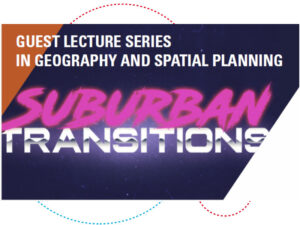Tuesday, October 2nd, 13h-14h | MSH – Black Box
CAN URBAN SPRAWL BE HALTED IN FLANDERS? GEO-RESEARCH IN SUPPORT OF SPATIAL PLANNING POLICY
Dr Guy Engelen, Flemish Institute for Technological Research, VITO-Flemish Institute for Technological Research
1st guest lecture of the Guest lecture series in geography « SUBURBAN TRANSITIONS »
Attendance is free. No registration.
AbstractFlanders, the autonomous region in the northern half of Belgium, has long been typified by a diffuse urban settlement pattern with extensive ribbon development. No less than 32,5% of its territory is taken in by settlement area, and, it is at the top in the EU with respect to urban sprawl (EEA, 2016). Flanders thus is confronted with great difficulties in meeting objectives with respect to environmental quality, biodiversity, renewable energy among others. Aware of this, as well as of the great difficulty to stop or reverse this detrimental evolution, various departments of government are making more extensive use of advanced modelling tools and spatial analyses to better understand, monitor and control spatial development. The growing technical competence of civil servants, the abundance and availability of rich spatial datasets covering the territory of this relatively small region, as well as advances in the ICT-domain, have certainly propelled this process.
The lecture will dwell on applied research carried out in the last 5 years for the Spatial Planning Department in support of Flanders’ new Spatial Policy Plan. One key element in this plan is a ‘zero land take development’ by 2040. To the effect spatially-explicit scenarios were run and analysed using a cellular automata land use model, the current settlement pattern was examined and typified, the level of urban sprawl was quantified, and, preferential locations for densification and new urban development based on Transit Oriented Development were determined. This work laid the scientific foundation of the department’s strategic vision paper approved by the Flemish government on July 20th 2018. The implementation of the legally binding Spatial Policy Plan can now begin.
